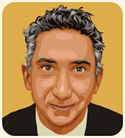Three days before the national vote, electoral observers cite grave concerns: unequal access to media outlets for the opposition candidate; media bias favoring the incumbent; smear campaigns against the opposition; and use of state resources for electoral advantage. Could these courageous observers be finally calling out the abuses of President Hugo Chávez and his government against challenger Henrique Capriles Radonski in the run-up to Venezuela’s 2012 election?
Sadly, no. Those allegations were in 2000 against then-Peruvian President Alberto Fujimori as he tried to run for re-election. Despite a parade of abuses similar to those of 2000, the international community has remained mute on Venezuela.
The contrast between 2000 Peru and Venezuela today is a depressing statement about how far the standards for free and fair elections have declined, as well as the international community’s new tolerance for autocrats who cynically assert national sovereignty to avoid scrutiny over fundamental human and democratic rights.
With a unified, rejuvenated and optimistic opposition and his Bolivarian revolution showing real cracks, President Chávez is facing his first serious electoral challenge since 1998. Chávez’ charisma may still ring strong with the poorer segments of the electorate that constitute his chavista base, but a growing segment of voters remain unconvinced that his revolution is delivering positive outcomes.
Polls have Chávez at his lowest point since coming to office in 1999, and many have Capriles Radonski within striking distance of victory. Consultores 21 even has Capriles Radonski ahead by two points. This threat to Chávez’ rule has sparked him to open up the spigots of government patronage more than usual, upping public spending by an alarming 30 percent according to one estimate. The loquacious executive has also asserted control over media outlets, regularly interrupting public and private broadcasts for hours-long speeches that tout his policies. Meanwhile, Carpiles Radonski is restricted to three minutes of campaign broadcasting per day.
At the same time, government-driven harassment of private media organizations, including social media accounts, has intimidated Venezuela’s once-vibrant independent media. The imbalance has prompted outside groups such as the Committee to Protect Journalists to raise objections about freedom of expression in Venezuela.
Chávez, 58, has also undertaken a smear campaign against his 40-year-old challenger—leveling accusations against Capriles Radonski of trying to dismantle social welfare programs and being a shill for the country’s “bourgeoisie” conservative elite. The president has also used anti-Semitic imagery and charged his opponent of fascism. You want Fujimori-style attacks? It doesn’t get much dirtier (or contradictory) than that.
Twelve years ago and under the thumb of a nominally right-wing government in Peru, such practices would have prompted cries of indignation and calls for a multilateral defense of democracy. While Chávez and his acolytes have fairly won previous elections—in 2005 because the opposition unwisely chose to boycott the elections—no such thing has occurred in Venezuela this year. The UNASUR delegation that has been allowed to observe election day must be prepared to speak out, irrespective of ideology.
The silence and timidity of the international community today is a step backward for the standards that it vigorously defended in 2000. And no matter the result of Sunday’s vote, the real loser is the Venezuelan electoral process and the one-time laudable hemispheric democratic consensus.
Christopher Sabatini is editor-in-chief of Americas Quarterly and senior director of policy at the Americas Society and Council of the Americas.





